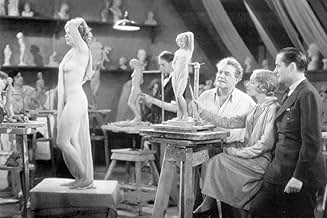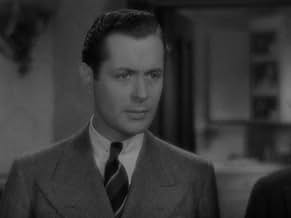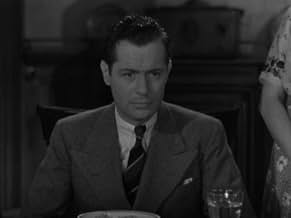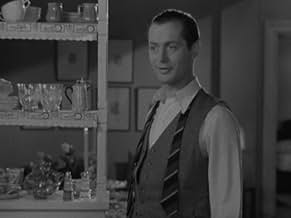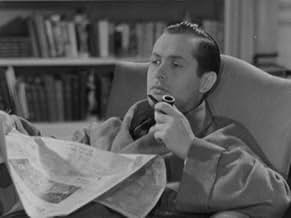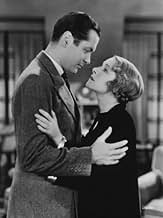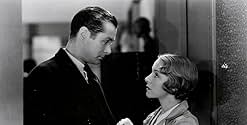Aggiungi una trama nella tua linguaA new bride learns she and her husband's stuck-up family don't speak the same language.A new bride learns she and her husband's stuck-up family don't speak the same language.A new bride learns she and her husband's stuck-up family don't speak the same language.
- Regia
- Sceneggiatura
- Star
- Premi
- 3 vittorie totali
Julia Bejarano
- Umbrella Peddler
- (non citato nei titoli originali)
William Farnum
- C. Forrester
- (non citato nei titoli originali)
Sherry Hall
- Purser
- (non citato nei titoli originali)
Recensioni in evidenza
These non politically correct movies are the most enjoyable. Although his comedy is best, Robert Monty's drama skills are put to good use in this romantic drama. Snobby family versus down-to-earth daughter in law is predictable but it still works.
A marvelous movie, from start to (just before the) finish.
We meet Robert Montgomery and Helen Hayes, with whom he has eloped recently, on shipboard. She is eager to start their home life together. All he can think of is seeing his mother.
Louise Closser Hale is superb as the suffocating matriarch of his family. The other members, including Henry Travers and Margaret Hamilton, are very good as well. Especially fine is John Beal, as Montgomery's nephew. Indeed, he gives a heart-wrenching performance. It's possibly the best in this movie and he is working against very stiff competition.
Montgomery is not only a mama's boy -- called Vicky by everyone, as his name is Victor. He is also a supreme narcissist: In one shocking scene, he inspects himself in a mirror over the mantel. Directly under the mirror is a plaster bust of him that Hayes has lovingly worked on sculpting. He doesn't even notice it.
It's very hard to fault this movie. The ending is a trifle disappointing. And a Mark Twain aphorism is spoken by one character and laughed at by others, as if it were original to this screenplay.
Hayes is superb and very likable. Montgomery, not generally a favorite of mine, is believable as her self-centered husband. Beal is absolutely superb in a very touching role. And Hale is subtle but compelling as the woman of iron who becomes an invalid the minute doing so will get what she wants from her offspring.
We meet Robert Montgomery and Helen Hayes, with whom he has eloped recently, on shipboard. She is eager to start their home life together. All he can think of is seeing his mother.
Louise Closser Hale is superb as the suffocating matriarch of his family. The other members, including Henry Travers and Margaret Hamilton, are very good as well. Especially fine is John Beal, as Montgomery's nephew. Indeed, he gives a heart-wrenching performance. It's possibly the best in this movie and he is working against very stiff competition.
Montgomery is not only a mama's boy -- called Vicky by everyone, as his name is Victor. He is also a supreme narcissist: In one shocking scene, he inspects himself in a mirror over the mantel. Directly under the mirror is a plaster bust of him that Hayes has lovingly worked on sculpting. He doesn't even notice it.
It's very hard to fault this movie. The ending is a trifle disappointing. And a Mark Twain aphorism is spoken by one character and laughed at by others, as if it were original to this screenplay.
Hayes is superb and very likable. Montgomery, not generally a favorite of mine, is believable as her self-centered husband. Beal is absolutely superb in a very touching role. And Hale is subtle but compelling as the woman of iron who becomes an invalid the minute doing so will get what she wants from her offspring.
"Another Language" works because the whole is greater than the sum of its parts - and that is not meant to insult the parts. Robert Montgomery plays multiple roles, and he plays them all well: sometimes a genuinely caring husband, sometimes a stand-offish snob, and sometimes a superior bully. It's as if he was doing a greatest hits part.
It is Helen Hayes, however, in one her rare film appearances, who shines out a little more than everyone else. She was really a fine actress, here playing the increasingly isolated and desperate wife of Robert Montgomery, the victim of a squeezing out instigated by Montgomery's petty family. Interesting how at one point one of his "sister-in-laws" suggests that Hayes is "not even that pretty". I guess she really wasn't particularly so, her eyes in particular seemingly too far apart.
But the script moves along delightfully. The ensemble scenes, of which there are many, bringing all 10 or so characters on screen at one time, are surprisingly fun. This is because the writers have managed to accomplish something quite difficult, in allowing the different character's personalities slowly to come through. None of them is all good, but none of them is really all bad, though as a group they are intimidating to poor Helen Hayes.
Even Margaret Hamilton, made up and dressed up to be especially homely, who appears to be the nastiest of the women, shows a little humanity at times - but it is never overdone. A nice touch.
But Henry Travers, as the kindly father, is a source of frustration for the viewer: he knows the games that everyone is playing, and is genuinely sympathetic to Hayes, yet he never actually speaks up for her. This weakness is all the more irksome because it is his wife, the manipulative matriarch (played quite well by Louise Hale), with her many fake fainting spells, who is the cause of the film's discord, and though he is not afraid of her, he never helps out either.
An interesting film, and not as predictable as it might seem.
It is Helen Hayes, however, in one her rare film appearances, who shines out a little more than everyone else. She was really a fine actress, here playing the increasingly isolated and desperate wife of Robert Montgomery, the victim of a squeezing out instigated by Montgomery's petty family. Interesting how at one point one of his "sister-in-laws" suggests that Hayes is "not even that pretty". I guess she really wasn't particularly so, her eyes in particular seemingly too far apart.
But the script moves along delightfully. The ensemble scenes, of which there are many, bringing all 10 or so characters on screen at one time, are surprisingly fun. This is because the writers have managed to accomplish something quite difficult, in allowing the different character's personalities slowly to come through. None of them is all good, but none of them is really all bad, though as a group they are intimidating to poor Helen Hayes.
Even Margaret Hamilton, made up and dressed up to be especially homely, who appears to be the nastiest of the women, shows a little humanity at times - but it is never overdone. A nice touch.
But Henry Travers, as the kindly father, is a source of frustration for the viewer: he knows the games that everyone is playing, and is genuinely sympathetic to Hayes, yet he never actually speaks up for her. This weakness is all the more irksome because it is his wife, the manipulative matriarch (played quite well by Louise Hale), with her many fake fainting spells, who is the cause of the film's discord, and though he is not afraid of her, he never helps out either.
An interesting film, and not as predictable as it might seem.
A young couple who've eloped (Robert Montgomery and Helen Hayes) return to New York and begin spending time with his family - his parents, two brothers and their wives, and his nephew. It slowly turns into a nightmare for her, because the mother is manipulative of her son, the sisters-in-law mix in cutting remarks with their pleasantries, and one of the brothers-in-law is an immature bore (one of the things he does is surprise women by running his hand along their back and making a slide whistle sound).
Her marriage begins to deteriorate because her husband sides with his family in their assessment that she's "high hatting" them. While it's true that she's more worldly and refined, she doesn't look down her nose at them at all, and in reality suffers from their barbs at the weekly get togethers. Enter the nephew (John Beal), who is also a bit of an outcast in the family, because he's interested in things like architecture and travel. He soon develops feelings for his aunt that go beyond normal affection, but despite her own unhappiness, she reminds him of how inappropriate it is.
You might divine that this is a pre-Code film because it deals with the incestual love a nephew has for his aunt, which, even if it isn't by blood, is obviously a taboo subject, or maybe because of a scene with a female model in the background of a sculpting class draped with thin sheer fabric. Despite how salacious it sounds (or how production stills show the model from the side, close-up and almost entirely nude), it feels pre-Code mostly because of how honest it is. There is such a realistic portrayal of the family's passive aggressiveness here that it's very frustrating and claustrophobic, and the script has a tight, very modern feel to it, particularly in the ensemble scenes.
I love Margaret Hamilton in this as one of the sister-in-laws, and Helen Hayes is as radiant as ever. Louise Closser Hale is great as the mother too, even if the character is irritating, and it's notable that it was her last film, as she would die at 60 two days before the film was released. It zips along at 77 minutes, never lagging, and while I wish it had ended a little differently, it made for a satisfying watch.
Her marriage begins to deteriorate because her husband sides with his family in their assessment that she's "high hatting" them. While it's true that she's more worldly and refined, she doesn't look down her nose at them at all, and in reality suffers from their barbs at the weekly get togethers. Enter the nephew (John Beal), who is also a bit of an outcast in the family, because he's interested in things like architecture and travel. He soon develops feelings for his aunt that go beyond normal affection, but despite her own unhappiness, she reminds him of how inappropriate it is.
You might divine that this is a pre-Code film because it deals with the incestual love a nephew has for his aunt, which, even if it isn't by blood, is obviously a taboo subject, or maybe because of a scene with a female model in the background of a sculpting class draped with thin sheer fabric. Despite how salacious it sounds (or how production stills show the model from the side, close-up and almost entirely nude), it feels pre-Code mostly because of how honest it is. There is such a realistic portrayal of the family's passive aggressiveness here that it's very frustrating and claustrophobic, and the script has a tight, very modern feel to it, particularly in the ensemble scenes.
I love Margaret Hamilton in this as one of the sister-in-laws, and Helen Hayes is as radiant as ever. Louise Closser Hale is great as the mother too, even if the character is irritating, and it's notable that it was her last film, as she would die at 60 two days before the film was released. It zips along at 77 minutes, never lagging, and while I wish it had ended a little differently, it made for a satisfying watch.
Another Language from 1933 stars Robert Montgomery, Helen Hayes, John Beal, and Louise Closser. Directed by Edward H. Griffith.
Montgomery and Hayes are Victor and Stella, who fell in love in Europe and eloped. After meeting his family back in the states, she gradually realizes that he's basically smothered by their closeness, and they all dance to the tune of their mother (Closser). She's very manipulative, the type who becomes ill whenever Victor and Stella want to leave town. The family finds Stella upper class and make annoying remarks couched as jokes.
(Note: Robert Taylor's mother was like this. The story is she went on the Taylor/Stanwyck honeymoon-untrue. She delayed it by becoming ill. Barbara referred to her as "that miserable b--.")
To make matters worse, Victor's nephew Jerry (Beal), who is not like the rest of the family, falls for Stella.
Victor needs to stand up for himself and Stella. Will he?
Good film. The cast, which also includes Margaret Hamilton, is very good. She and Beal repeat their Broadway roles. Hayes is lovely as the free-spirited wife who adores her husband but also likes to take art class twice a week.
I met John Beal many years ago. He was a lovely man who had a lot of success on Broadway. As a young leading man, he had a great start in films; postwar he worked more on stage.
Apparently, Norma Shearer was supposed to play the lead, but her husband, Irving Thalberg, had a heart attack, and she decided to stay home.
Montgomery and Hayes are Victor and Stella, who fell in love in Europe and eloped. After meeting his family back in the states, she gradually realizes that he's basically smothered by their closeness, and they all dance to the tune of their mother (Closser). She's very manipulative, the type who becomes ill whenever Victor and Stella want to leave town. The family finds Stella upper class and make annoying remarks couched as jokes.
(Note: Robert Taylor's mother was like this. The story is she went on the Taylor/Stanwyck honeymoon-untrue. She delayed it by becoming ill. Barbara referred to her as "that miserable b--.")
To make matters worse, Victor's nephew Jerry (Beal), who is not like the rest of the family, falls for Stella.
Victor needs to stand up for himself and Stella. Will he?
Good film. The cast, which also includes Margaret Hamilton, is very good. She and Beal repeat their Broadway roles. Hayes is lovely as the free-spirited wife who adores her husband but also likes to take art class twice a week.
I met John Beal many years ago. He was a lovely man who had a lot of success on Broadway. As a young leading man, he had a great start in films; postwar he worked more on stage.
Apparently, Norma Shearer was supposed to play the lead, but her husband, Irving Thalberg, had a heart attack, and she decided to stay home.
Lo sapevi?
- QuizModern sources state that Helen Hayes replaced Norma Shearer in the lead after Shearer decided to stay at home and nurse her husband, Irving Thalberg, who had suffered a serious heart attack.
- BlooperWhen Sally is pouring coffee for Victor, she gets distracted and spills some - it splashes out of the saucer and onto the tablecloth. However, in the next shot where she switches cups with Victor, there is no evidence of the spilled coffee on the tablecloth.
- Citazioni
Mother Hallam: [Victor has left the house against his mother's wishes] Victor! Come back here!
[she swoons]
Pop Hallam: Don't bother to faint, Mom, he can't see you.
Mother Hallam: [suddenly alert, and very irritated] Shut up!
- Curiosità sui creditiIn the beginning credits portraits of the actors who portray the main characters are shown with a hand flipping through a photo album of the Hallam Family.
- ConnessioniFeatured in This Side of Heaven (1934)
- Colonne sonoreThe Wedding of the Painted Doll
(uncredited)
Music by Nacio Herb Brown
Lyrics by Arthur Freed
Played on the Victrola
I più visti
Accedi per valutare e creare un elenco di titoli salvati per ottenere consigli personalizzati
Dettagli
Botteghino
- Budget
- 272.297 USD (previsto)
- Tempo di esecuzione1 ora 17 minuti
- Colore
- Proporzioni
- 1.37 : 1
Contribuisci a questa pagina
Suggerisci una modifica o aggiungi i contenuti mancanti

